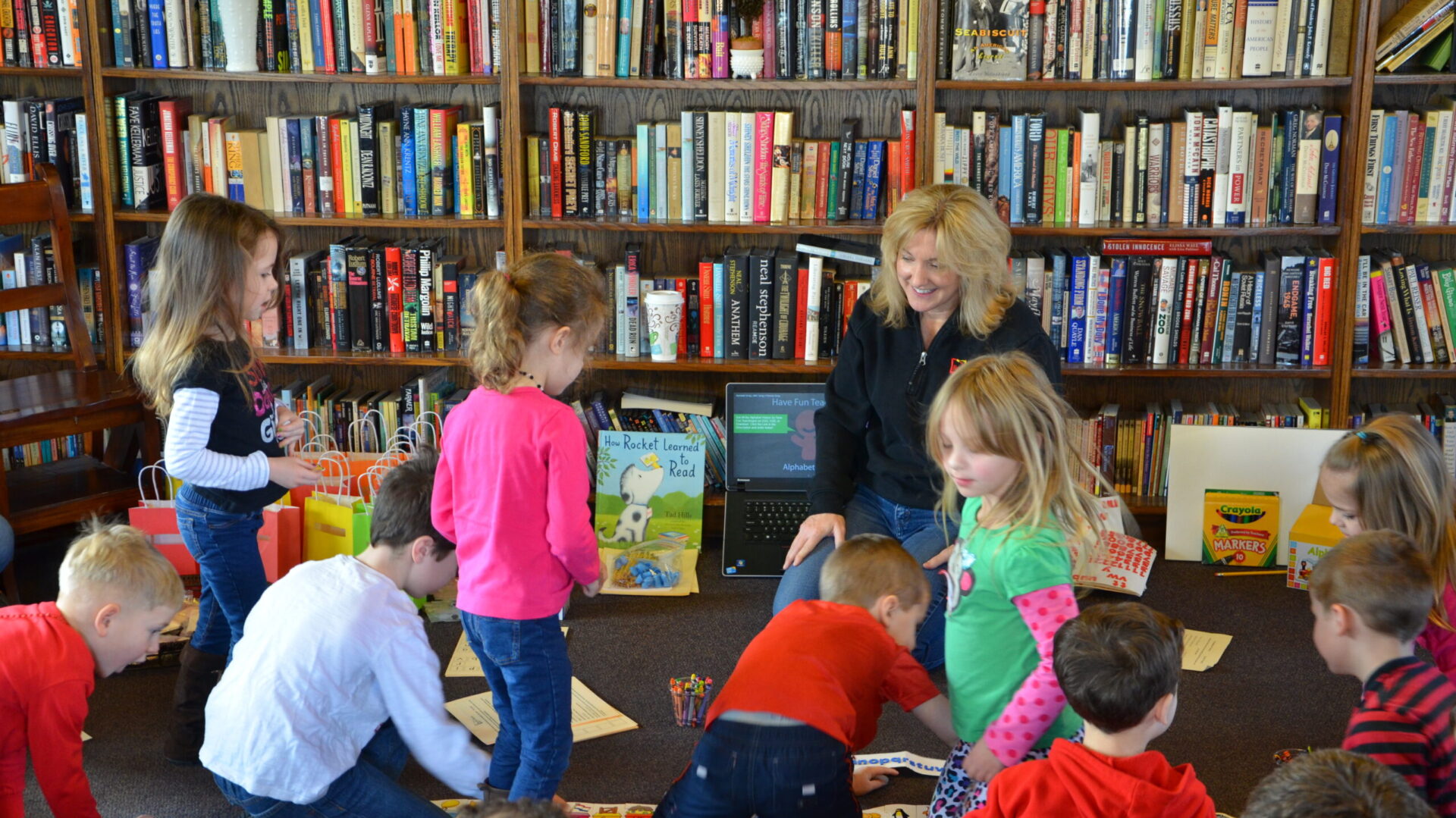
Hello Book Bums families!
This week in the newsletter Dr. Christy shares more about her new podcast series on the sounds we hear in words as well as a short quiz you can take to test yourself. You'll also find all your favorite, regular features.
For National Poetry Month in April we return to our tradition of sharing poetry each week. Find the first installment as you read today.
Bookbums.com is an Amazon Associate; We earn from qualifying purchases. This means that if you click on a link to Amazon.com and make a purchase, We may earn a small commission at no extra cost to you. We do recommend the products. Feel free to find them by other means.
Word of the Week
recede (re-seed) verb/action word - to move back or away, to withdraw
As we set out for vacation and drove down the street, our house receded from view.
Literary Calendar
• March 30 is the birthday of Anna Sewell.
• Sewell is the author of Black Beauty, her only published work.
• This short animated video shares more about her life, her connection to horses, and how Black Beauty had an effect on animal welfare.
From our Bookshelves

I saw the following video clip on social media a while back: https://www.facebook.com/reel/641698874855183
It struck a chord, and I bought the book.
I’m not sure if I felt the connection most when thinking about my family growing up or thinking about how my adult children might consider my husband and me when they were growing up.
Either way, I found some helpful thoughts and was inspired to reach out to a family member whom I’d not been in touch with for quite some time. I remembered that our days are numbered and that he has reasons for his behaviors. I decided to allow him the freedom to be who he is, think what he thinks, and do what he does while also embracing the freedom to respond to him in a way that can work for me. I feel good about the step I took.
Many book reviewers felt Let Them was “life changing” while others found it repetitive and short on substance. Either way, the average review was over four stars everywhere I looked.
As for me, I’m glad I read it, but I would not consider it a must read.
My favorite review was this one:
It is the single funniest book I have ever encountered. It is about a woman realizing and adapting to the basic thought process of a man and being shocked by how many imaginary problems disappear from her life.
Ha! So funny and— kind of true
Practical Grammar
While I was writing about the book Let Them by Mel Robbins, I wrote the words a while and I thought about the difference between a while and awhile. I thought I’d share how each is used.
awhile (adverb):
• Means for a short time or briefly.
• Modifies a verb, often indicating the duration of an action.
• Examples: We rested awhile, She’ll wait awhile, and The kids read awhile.
a while (noun phrase):
• Means a period of time.
• Can be used in phrases like in a while, for a while, or a while ago.
• Examples: It's been a while since I've read this book, We'll go to the library in a while, and We'll be staying here for a while.
Tips for Families

It’s springtime, and though that can mean cold and rainy days (especially if you’re in Ohio), it can also mean delightfully warm and sunshiny days.
This week’s family tip is to dine al fresco with your family.
“Al fresco” means in the fresh air in Italian, so dining al fresco is simply eating outdoors in the fresh air.
Whether it’s a planned outing to the park complete with blankets, sunscreen, and frisbees or an impromptu meal of burgers and fries atop a dropped tailgate, there may be no better spring outdoor activity than a picnic.
Or you can simply head outside onto the porch or deck.
Our kids loved eating outside on our front porch, so we put a child-size picnic table out there when they were young. Today, we still have a table set up for outdoor dining.

Sure, it takes a bit more effort to lug everything outdoors, but it sure is worth it. Be sure the kids help and encourage them to say, “We’re eating al fresco!”
BONUS: Stanford neuroscientist Dr. Andrew Huberman recommends getting 5-10 minutes of sunshine within an hour of waking in the morning. By simply eating breakfast outdoors, you can increase cortisol levels by 50%. This will increase immune function and alertness and can even signal to your body that it’s time to sleep 14-16 hours later.
Breakfast al fresco for the win!
Tips for Raising Readers and Writers

I saw the word amok in a book recently, and I thought the word looked exceedingly odd. It’s not how I would have written it, so I looked it up.
Sure enough, under amok it said,
1. behave uncontrollably and disruptively.
While both "amok" and "amuck" are used to describe behaving in a wild, uncontrolled, or frenzied manner, "amok" is the preferred and more common spelling.
When the kids you love are behaving uncontrollably or disruptively, you might say, “These kids have run amok!”
Challenge your kids to use the phrase run amok correctly three times this week. (Preferably with, “We won’t” or “Things won’t” preceding it!)
Pause for Poetry
Sentimental Moment or Why Did the Baguette Cross the Road
by Robert Hershon
Don’t fill up on bread
I say absent-mindedly
The servings here are huge
My son, whose hair may be
receding a bit, says
Did you really just
say that to me?
What he doesn’t know
is that when we’re walking
together, when we get
to the curb
I sometimes start to reach
for his hand
News from Book Bums

This week, on the podcast On Your Way with Dr. Christina Williams we’re sharing a M-F mini-series with lots of information to promote kids’ phonological and phonemic awareness—equipping kids with a keen awareness of the sounds we hear in words.
Whether you’re an early childhood teacher, a teacher of English learners, or a loving caregiver for beginning readers, you’ll find lots of fun-focused and exceedingly helpful information in the show notes. Download those materials wherever you enjoy listening to podcasts.
Monday- recognizing when words rhyme and when they don’t and making rhymes
Tuesday- recognizing when words begin and end with the same sounds, sound production
Wednesday- listening well, including listening to words stretched out, phoneme by phoneme, and snapping those sounds back together to make a word we know (supports strong decoding skills)
Thursday-phoneme manipulation (switching sounds in words to make new words)
Friday-helping kids to hear and stretch apart the sounds in words (supports strong spelling skills)
Tips for Teachers
When we talk about phonemic awareness in literacy education, we’re talking about students’ awareness of sounds in words.
Sure, sure. Hearing the sounds in words . . . No problem, right?
Try this quick phonemic awareness quiz to see how you fare:
1. What’s the first sound you hear in Eunice?
2. What’s the final sound you hear in song?
3. How many sounds do you hear in the word ax?
4. How about loud?
5. What is the first sound we hear in queen?
6. How many sounds do you hear in the word car?
7. How many sounds do you hear in the word I (and eye)?
8. Why might a student begin spelling the word win with a d?
9. What word do you have when you change the short o vowel sound in sought to the short a sound?
10. Why do we stop focusing on phonemes so much when kids are learning more advanced phonics rules?
Here are the answers:
1. /y/
2. /ng/ (one nasally sound)
3. 3, /a/, /k/, /s/
4. 4, /l/, /a/, /w/, /d/ (O-u says /Ow!/ which is a diphthong—it’s two vowel sounds within a single syllable.)
5. /k/
6. 3, /k/, /o/, /r/
7. 2, /o/, /ee/ (What?! Yes. It’s another diphthong.)
8. The name of the letter w begins with /d/. (I’ve seen this happen!)
9. sat
10. The rules we’re teaching kids do not necessarily have 1-1 phoneme/grapheme correspondences.
It’s not easy, is it?
Just for Fun

If you know someone who would benefit from our newsletter or tutoring at Book Bums, please share this email with them! Thank you.
Copyright © 2024 Book Bums, All rights reserved
Our mailing address is:
7967 Cincinnati-Dayton Road Suite L
West Chester, OH 45069

